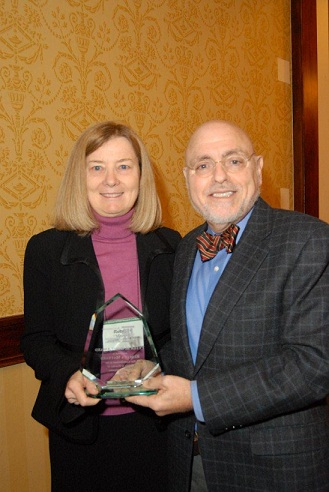Return to the Rossi Award page.
We are delighted to announce that Rebecca A. Maynard of the University of Pennsylvania has been selected to receive the 2009 Peter H. Rossi Award for Contributions to the Theory or Practice of Program Evaluation. (To read her acceptance
remarks, please click here.)
Rebecca Maynard is University Trustee Chair Professor of Education and Social Policy at the University of Pennsylvania. She is also Senior Program Associate at the William T. Grant Foundation. From 1974 to 1986, she was a senior vice president of Mathematica Policy Research (MPR) and from 1986 to 1992 where she directed the Princeton Research office.
In the words of one nominator, The depth, scope, and longevity of Becka's involvement with evaluation of social policy are, in my opinion, unparalleled. Since her work on her Ph.D., which was based on the Rural Income Maintenance experiment, Becka has been deeply involved in the full range of evaluation activities. She has participated in numerous randomized controlled trials both as a designer and analyst and as a project leader.

Photo by Ward Morrison |
Rebecca Maynard is best known for her experience and expertise in the design and conduct of randomized controlled trials in the areas of education, employment and training, and social welfare. She has overseen the design and implementation of dozens of experimental-design evaluations of important programs, policies and practices, beginning with her dissertation research, which examined the impacts of a negative income tax program on the home environments and school performance of children from low-income families. In the intervening years, she has directed many large-scale randomized controlled trials, including two multi-site demonstrations of innovative programs and policies for first-time teenage parents (one focused on testing the impacts of home visitor services and the other focused on testing the benefits of requiring and supporting teenage parents to engage in school, work, or job training); two large, national programs to test locally-designed and implemented school dropout prevention strategies (one initiated by the U.S. Department of Education and the other commissioned by the U.S. Department of Labor); four studies (involving dozens of schools) to test different strategies aimed at delaying sexual initiation and reducing the rate of unprotected sex among adolescents; a multi-school trial of a distributed leadership professional development program; two studies of after school programs (one recreation-focused and the other intended to improve academic outcomes) and a study of volunteer tutoring in elementary schools serving low-income children.
Virtually all of these studies have involved mixed methods of research that collectively addressed not only the causal relationships between the focal interventions and the outcomes they were intended to affect, but also questions that can be addressed using descriptive, correlational, and qualitative analyses. The descriptive analyses documented the context in which the interventions were conducted, the manner in which they were implemented, and their intensity. The correlational and qualitative analyses examined factors that might have facilitated and/or impeded successful implementation of the intervention and that potentially could explain the presence or absence of measured impacts attributed to the intervention.
Presently, Maynard is co-principal investigator (with Howard Rolston, Abt Associates) for a large demonstration initiative to test innovative strategies to promote self-sufficiency among low-income families and collaborating on a randomized controlled trial of innovative middle school science curricula. She also is working with the School District of Philadelphia and community based partners to learn from ongoing efforts to infuse the curricula with Skills for the 21st Century.
Maynard has published on diverse topics and in a wide range of journals and edited volumes. She has published articles that focus on research methods (for example, in the Journal of Human Resources, Child Development Perspectives, and Evaluation Review); experimental tests of particular programs, policies or practices (for example, in the American Economics Review, the Journal of Human Resources, and the Review of Economics and Statistics); systematic reviews (for example, the Campbell Collaboration and Evaluation and Research in Education); and research retrospectives and reflections (for example, the Journal of Policy Analysis and Management, Evaluation, and Rassegna Italiana di Valutazione). One of her best known publications is Kids Having Kids, a seminal volume for which she is contributing author and editor, that examines the economic and social costs of teenage childbearing. The first edition of this book earned the Best Book Award from the Society for Research on Adolescents.
Since joining the faculty of the University of Pennsylvania in 1993, Maynard has taught courses in research methods, economics of education, and systematic review methods. She had mentored many doctoral and masters students, including chairing the committees of fifteen students who have earned their doctoral degrees and accepted positions at major universities, premier research organizations, state governments, or the federal government. Presently, she directs the University of Pennsylvania's Institute of Education Sciences Predoctoral Training Program in Interdisciplinary Methods for Education Sciences, a program that supports twenty-four doctoral students in economics, sociology, psychology, business, and education.
Maynard has been an active member of APPAM since its inception and is a past president. Presently, she is on the Advisory Boards for the Society for Educational Effectiveness, and she is a Fellow of the American Education Research Association.
Back to top